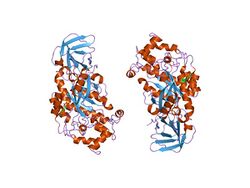Biology:Glycoside hydrolase family 29
| Alpha-L-fucosidase | |||||||||
|---|---|---|---|---|---|---|---|---|---|
 crystal structure of thermotoga maritima alpha-fucosidase | |||||||||
| Identifiers | |||||||||
| Symbol | Alpha_L_fucos | ||||||||
| Pfam | PF01120 | ||||||||
| Pfam clan | CL0058 | ||||||||
| InterPro | IPR000933 | ||||||||
| PROSITE | PDOC00324 | ||||||||
| SCOP2 | 1hl9 / SCOPe / SUPFAM | ||||||||
| CAZy | GH29 | ||||||||
| |||||||||
In molecular biology, glycoside hydrolase family 29 is a family of glycoside hydrolases.
Glycoside hydrolases EC 3.2.1. are a widespread group of enzymes that hydrolyse the glycosidic bond between two or more carbohydrates, or between a carbohydrate and a non-carbohydrate moiety. A classification system for glycoside hydrolases, based on sequence similarity, has led to the definition of >100 different families.[1][2][3] This classification is available on the CAZy web site,[4][5] and also discussed at CAZypedia, an online encyclopedia of carbohydrate active enzymes.[6][7]
Glycoside hydrolase family 29 includes alpha-L-fucosidases,[8] They are lysosomal enzymes responsible for hydrolyzing the alpha-1,6-linked fucose joined to the reducing-end N-acetylglucosamine of the carbohydrate moieties of glycoproteins. Alpha-L-fucosidase is responsible for hydrolysing the alpha-1,6-linked fucose joined to the reducing-end N-acetylglucosamine of the carbohydrate moieties of glycoproteins.
Fucosylated glycoconjugates are involved in numerous biological events, making alpha-l-fucosidases, the enzymes responsible for their processing, critically important. Deficiency in alpha-l-fucosidase activity is associated with fucosidosis, a lysosomal storage disorder characterised by rapid neurodegeneration, resulting in severe mental and motor deterioration.[9] The enzyme is a hexamer and displays a two-domain fold, composed of a catalytic (beta/alpha)(8)-like domain and a C-terminal beta-sandwich domain.[9]
Drosophila melanogaster spermatozoa contains an alpha-l-fucosidase that might be involved in fertilisation by interacting with alpha-l-fucose residues on the micropyle of the eggshell.[10] In human sperm, membrane-associated alpha-l-fucosidase is stable for extended periods of time, which is made possible by membrane domains and compartmentalisation. These help preserve protein integrity.[11]
References
- ↑ "Conserved catalytic machinery and the prediction of a common fold for several families of glycosyl hydrolases". Proceedings of the National Academy of Sciences of the United States of America 92 (15): 7090–4. July 1995. doi:10.1073/pnas.92.15.7090. PMID 7624375. Bibcode: 1995PNAS...92.7090H.
- ↑ "Structures and mechanisms of glycosyl hydrolases". Structure 3 (9): 853–9. September 1995. doi:10.1016/S0969-2126(01)00220-9. PMID 8535779.
- ↑ "Updating the sequence-based classification of glycosyl hydrolases". The Biochemical Journal 316 (Pt 2): 695–6. June 1996. doi:10.1042/bj3160695. PMID 8687420.
- ↑ "Home" (in en). http://www.cazy.org/.
- ↑ "The carbohydrate-active enzymes database (CAZy) in 2013". Nucleic Acids Research 42 (Database issue): D490-5. January 2014. doi:10.1093/nar/gkt1178. PMID 24270786.
- ↑ "Glycoside Hydrolase Family 29" (in en). http://www.cazypedia.org/index.php/Glycoside_Hydrolase_Family_29.
- ↑ CAZypedia Consortium (December 2018). "Ten years of CAZypedia: a living encyclopedia of carbohydrate-active enzymes". Glycobiology 28 (1): 3–8. doi:10.1093/glycob/cwx089. PMID 29040563. https://hal.archives-ouvertes.fr/hal-01886461/file/Hehemann_2018_01.pdf.
- ↑ "Isolation and sequence analysis of a cDNA encoding rat liver alpha-L-fucosidase". The Biochemical Journal 264 (3): 695–701. December 1989. doi:10.1042/bj2640695. PMID 2482732.
- ↑ 9.0 9.1 "Crystal structure of Thermotoga maritima alpha-L-fucosidase. Insights into the catalytic mechanism and the molecular basis for fucosidosis". The Journal of Biological Chemistry 279 (13): 13119–28. March 2004. doi:10.1074/jbc.M313783200. PMID 14715651.
- ↑ "Expression study of an alpha-l-fucosidase gene in the Drosophilidae family". Gene 420 (1): 23–33. August 2008. doi:10.1016/j.gene.2008.04.021. PMID 18556148.
- ↑ "Stabilization of membrane-associated alpha-L-fucosidase by the human sperm equatorial segment". International Journal of Andrology 32 (5): 556–62. October 2009. doi:10.1111/j.1365-2605.2008.00897.x. PMID 18522672.
 |

